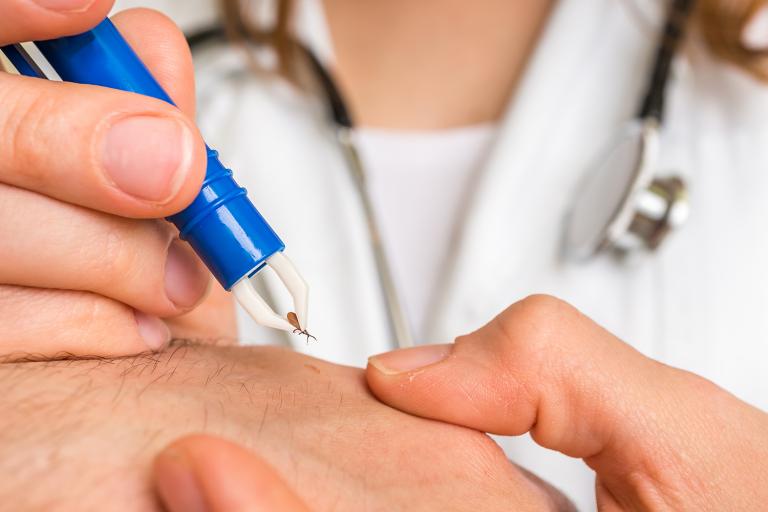I was truly concerned.
During the popular Parasite Summit I participated in recently, I didn’t realize how many of you are suffering with Lyme disease. When Lyme goes from the initial fatigue, fever, rash and body aches to become chronic and neurologic, it is one of the Mystery Diseases of the 21st century – difficult to diagnose and even more of a challenge to treat.
I went in search of a multi-faceted approach and found Scott Forsgren, the Better Health Guy. He has taken charge of his own Lyme disease experience. He has really turned his health around and wants to teach others to do the same. I had the pleasure of his company in my home this past summer. Over dinner, he shared his story and groundbreaking approach with me.
A Holistic Approach to Lyme
His journey of over 20 years through chronic Lyme disease led Scott to develop a holistic road map to navigate the underlying issues of this complex disease. Taking charge of your health with Lyme disease means you unburden the body of as many stressors as possible so it can heal. The beauty of this approach is that we don’t have to address every possible issue. And this is a plan to navigate through other incurables.
The body has an innate wisdom and our job is to allow it to do what it was designed to do. Lyme disease is a difficult journey. The good news is you can move beyond it to live your best life. New insights and perspectives allow us to emerge from a very dark place and look back on the experience as a precious gift.
Lyme Doesn’t Work Alone
Scott believes one of the biggest challenges in recovering from Lyme disease is to not focus too much on killing the microbes involved. This is not to suggest that Borrelia, Bartonella, Babesia, and other vector-borne microbes aren’t issues that need to be dealt with; they certainly are. However, by the time someone is chronically ill with Lyme disease, an overburdened immune system opens the door to many more issues that need to be addressed.
It is important to step back and look at all of the potential things that may need to be explored to regain one’s health – leave no stone unturned. While this may sound overwhelming, it doesn’t mean that you need to explore them all overnight. Listen to your body and go at your own pace.
Mold ALERT
I cannot stress enough how important it is to ensure the environment where you live, work, and go to school is free from water damage and biotoxins that can lead to CIRS (Chronic Inflammatory Response Syndrome). Everyone with Lyme disease should, at a minimum, know the ERMI and HERTSMI-2 scores of their home. In Scott’s journey, biotoxin illness from water-damaged buildings was one of his top issues. He experienced mold illness on two separate occasions, and addressing it each time was an important part of his continued recovery.
If mold illness is an issue, people often make significant progress once it has been addressed. While they may still need to treat their Lyme-related microbial issues, the treatment is often met with much less resistance by the body and often takes less time to yield benefits when the mold issue has been taken off the table.
Detox for Life
Detoxification is a critical aspect of improving health with Lyme disease. We encounter numerous environmental toxins on a daily basis, including heavy metals, pesticides, chemicals, and many others. Microbes inhabit us due to our inner terrain; the more toxic we are, the more the unfriendly microbes take up residence within us. When we focus on detoxification, our internal environment supports the helpful microbes. Incorporating appropriate binders, drainage remedies, and organ support options is a key part of improving overall health when dealing with Lyme disease.
The Relationship Between Lyme, Candida, and Parasites
Parasites and candida play a role in many with Lyme disease, and many thought leaders (including me) suggest these should be addressed as early in the holistic protocol as possible, as they may create biofilms and be hosts to smaller organisms. Parasites are generally believed to be a problem only in developing countries, and yet, parasites and their eggs have been found in salad bars in major US cities.
Some organisms such as candida and parasites may be protective when in balance; they have the ability to bind or concentrate heavy metals (like mercury and aluminum) which minimizes the damage the metals may otherwise do within the body. But once out of balance, their numbers need to be reduced through a good parasite program and low sugar diet.
Electromagnetic Fields (EMFs) and Aggression
EMFs have become more and more prevalent in our environment, and research is beginning to show the detrimental health implications of ongoing exposure. EMF exposure may lead to the microbes within us becoming more aggressive, as they feel the need to protect themselves from the EMF onslaught that we all face on a daily basis.
The Mind-Body Connection
Mental and emotional health may need to be explored. Even if we did not experience a trauma or conflict earlier in life that may have set the stage for chronic illness, the process of going through something like Lyme disease and being invalidated many times along the way is itself an emotional stress that may require inner-work.
Find the Rest of Your Story and Take Charge of Your Health
Dental amalgams, root canals, and cavitations play a role in burdening the body, and often need to be addressed. Diet, nutrition, microbiome optimization, restorative sleep, and movement are all key considerations to move someone with Lyme disease toward health. Listen to your body and take charge of your Lyme disease, one step at a time.
Scott has shared his journey with many people who have found healing and are living their best life, the next success story can be you!

